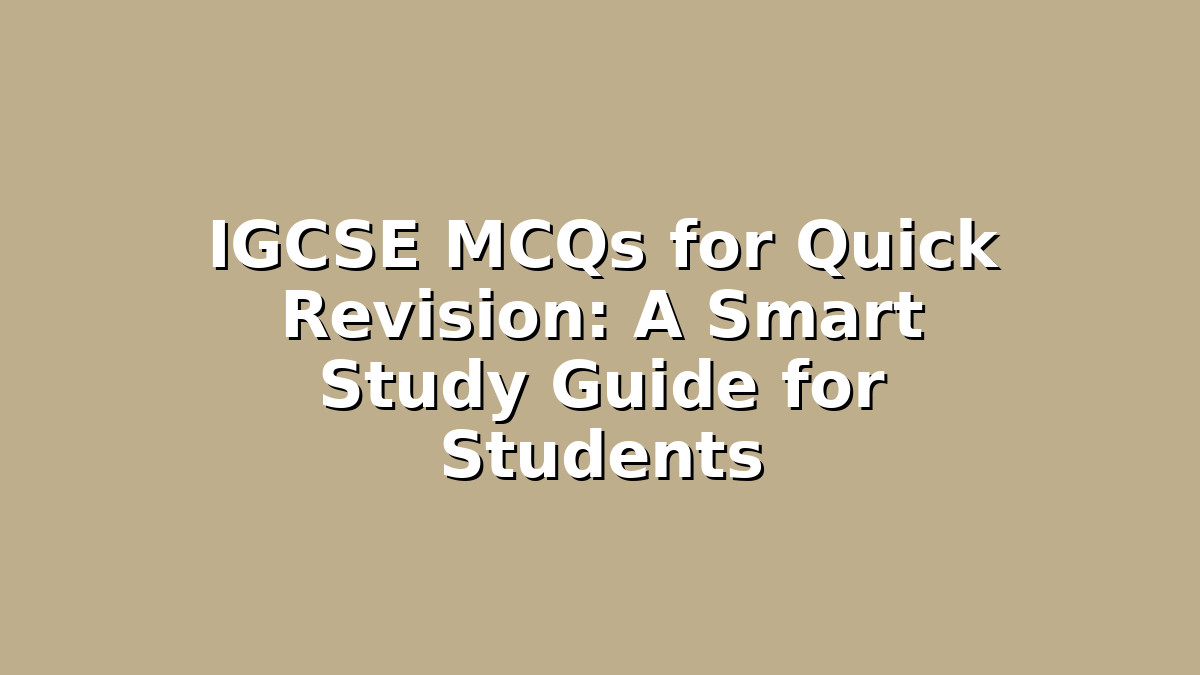Preparing for your IGCSE exams can be both exciting and challenging. With so much content to cover across different subjects, finding effective and efficient study methods is essential. One powerful tool that many students overlook is Multiple Choice Questions (MCQs). Using IGCSE MCQs for quick revision not only helps reinforce your knowledge but also improves exam techniques and time management. In this article, we’ll explore how you can use IGCSE MCQs to boost your revision, along with practical tips to maximize your exam preparation.
Why Use IGCSE MCQs for Quick Revision?
Multiple Choice Questions are commonly used in IGCSE exams because they test a wide range of skills—from factual recall to analytical thinking. Practicing MCQs allows you to:
– Identify gaps in your knowledge quickly.
– Build confidence by familiarizing yourself with exam-style questions.
– Improve your time management during exams through timed practice.
– Enhance recall through active engagement.
By integrating MCQs into your revision plan, you create a dynamic study routine that keeps you alert and focused. Let’s dive into three detailed strategies to make the most of IGCSE MCQs for your quick revision.
1. Use MCQs to Pinpoint Weak Areas and Reinforce Strengths
One of the biggest challenges during exam preparation is knowing what to study and what you already know well. IGCSE MCQs are a fantastic diagnostic tool to assess your understanding of different topics.
– Start with a broad set of MCQs: Select practice papers or question banks that cover all the topics in your syllabus. This gives a clear overview of your abilities.
– Track your scores by topic: Create a simple spreadsheet or notebook where you keep track of your results for each chapter or theme. For example, if you’re revising Biology, note down your scores on “Cell Biology,” “Genetics,” and “Ecology” separately.
– Focus your revision: Once you identify weak topics where your accuracy is below 70%, prioritize them in your study sessions. Use textbooks, online resources, or video tutorials to strengthen these areas.
– Revisit strong topics occasionally: Don’t ignore topics you’re good at. A quick MCQ quiz every few days can help keep these areas fresh and maintain your confidence.
Regularly testing yourself with MCQs ensures your revision is targeted and effective rather than random and overwhelming.
2. Practice Under Exam Conditions to Improve Speed and Accuracy
IGCSE exams have strict time limits, so managing your time efficiently is crucial. Practicing MCQs under exam conditions simulates the real test environment and enhances your time management skills.
– Set a timer: Allocate a specific amount of time to complete a set of MCQs, just like in the actual exam. For instance, if you have 40 questions and 50 minutes, practice answering within this time frame.
– Create a distraction-free environment: Find a quiet room, turn off your phone, and avoid interruptions to build focus and concentration.
– Read questions carefully: It’s tempting to rush, but MCQs often contain tricky wording or subtle hints. Practice reading each question thoroughly before choosing an answer.
– Review incorrect answers immediately: After completing a timed test, spend time understanding why you got questions wrong. This reflection helps prevent repeating the same mistakes.
– Gradually increase difficulty: Start with easier questions to build confidence, then challenge yourself with more difficult MCQs that require deeper analysis.
Practicing MCQs under realistic conditions trains you to think quickly and accurately, which is a vital skill for your IGCSE exams.
3. Use Online MCQ Resources and Apps for Interactive Learning
With technology at your fingertips, you don’t have to rely solely on traditional textbooks for revision. There are many free and paid online platforms and smartphone apps designed specifically for IGCSE students that provide extensive MCQ quizzes.
– Interactive quizzes with instant feedback: Many apps explain why an answer is correct or incorrect, helping you learn as you go.
– Customizable practice tests: You can select specific subjects, topics, or difficulty levels to tailor your practice.
– Progress tracking: Online tools often provide graphs and statistics on your improvement, motivating you to keep going.
– Gamified learning: Some platforms turn MCQ practice into games or competitions, making revision fun and less stressful.
– Accessibility: You can practice anytime and anywhere, making it easier to fit revision into your daily schedule.
Popular resources include websites like Seneca Learning, Quizlet, and Gojimo, which offer IGCSE-specific content. Using these digital tools alongside your textbooks can diversify your study routine and cater to different learning styles.
Conclusion
IGCSE MCQs are a versatile and effective way to boost your exam preparation. By identifying your weak areas, practicing under timed conditions, and taking advantage of online resources, you can make your revision more focused and productive. Remember, consistent practice is key—regularly testing yourself with MCQs keeps your mind sharp and builds confidence ahead of exam day. Stay positive, stay organized, and use these smart strategies to achieve the best results possible in your IGCSE exams.
Good luck, and happy revising!

Responses